Girls With Fainting Disorder Asks If She's Wrong For Not Wanting To Train Her Current Dog To Be Her Service Dog
Service dogs deserve a special spot in heaven. They work all their lives to help make other people's lives easier, safer, and more fulfilling, despite the sicknesses or disabilities that they have.
Training a service dog is not easy, however. There are many requirements before a pup can be qualified to work as a service dog.
Usually, there are only a few breeds that have the temperament to become great service dogs. In addition to their nature, they must be trained for years, starting when they're just a few months old, to make them fit for the job.
This training also doesn't end when they're handed off to the human they're supposed to care for. It's a constant cycle of training every single day to ensure that they do their job properly.
That's why getting one isn't such an easy decision. Redditor icrymyselftosleep5 has been faced with such a decision, and when she finally decided to get one, her family suggested she have her current retriever dog trained.
The only problem is that her retriever is already more than a year old and has a break in her leg that causes her pain and discomfort. Because of that, OP wants to train and adopt another dog; however, her family is strongly against it.
And now, she's wondering if she's making the right decision. Here's the whole story.
OP asks:

To help her manage her illness, OP has been thinking about getting a service dog

While they do have a retriever she could train, she thinks the dog is past the best training period, and she doesn't want to put too much stress on the dog.
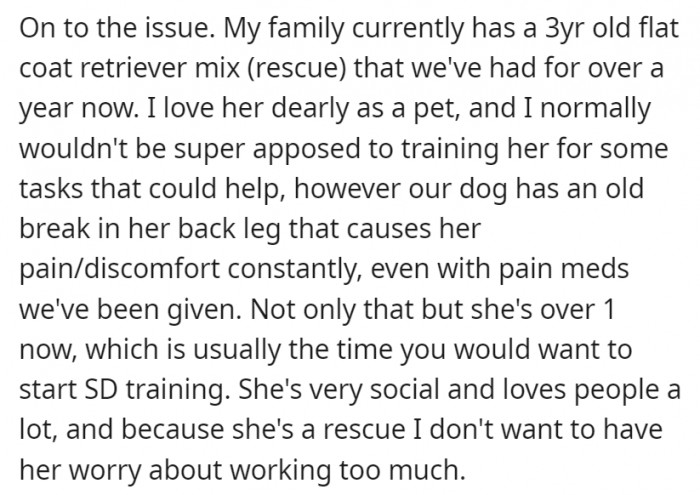
The Emotional Complexity of Service Animals
Dr. Sarah Thompson, a clinical psychologist specializing in animal-assisted therapy, explains that the decision to train a dog as a service animal can evoke complex emotions.
People often feel a strong bond with their pets, and the thought of imposing additional stress on an already injured animal can lead to feelings of guilt and conflict.
This dilemma highlights the psychological concept of empathy, where an individual's ability to understand and share the feelings of another can complicate decision-making.
OP also thinks her current dog doesn't have the right focus to work with her needs

Her family also has biases regarding the kind of dog she can adopt to be her SD

Having the kind of illness that can disrupt daily life, as OP does, is not easy. It would be great for her to have help in managing her days, and a service dog is a perfect solution.
However, of course, there are many different requirements for a dog to become a service dog. Many people in the comments agree with OP about her feelings toward her current dog.
Some people even gave her great advice on how to move forward. Here are some of the best comments.
1. This person suggests that OP look more into training programs and certifications in their area to help with their decision
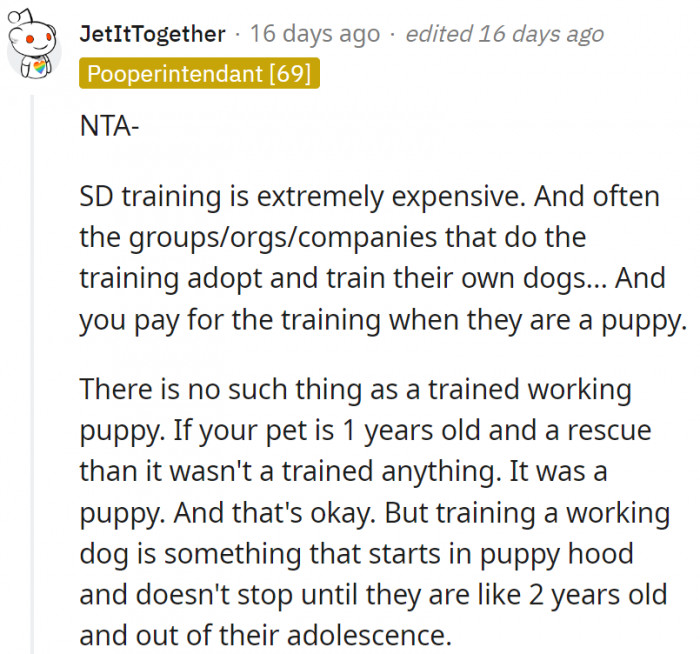
Research in the field of human-animal interaction indicates that service dogs can significantly improve the quality of life for individuals with health conditions; yet, this comes with responsibilities.
Studies show that the mental health benefits of having a service animal can be profound, including reduced anxiety and increased feelings of safety.
However, these benefits must be weighed against the potential stress placed on the animal, particularly one that is already physically compromised.
These organizations provide around-the-clock training to ensure the dog is fully trained
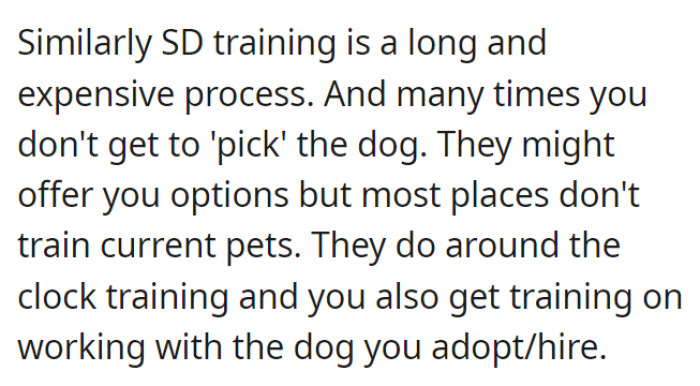
As this person said, most of the time, SD dogs are selected for training based on behavioral assessments
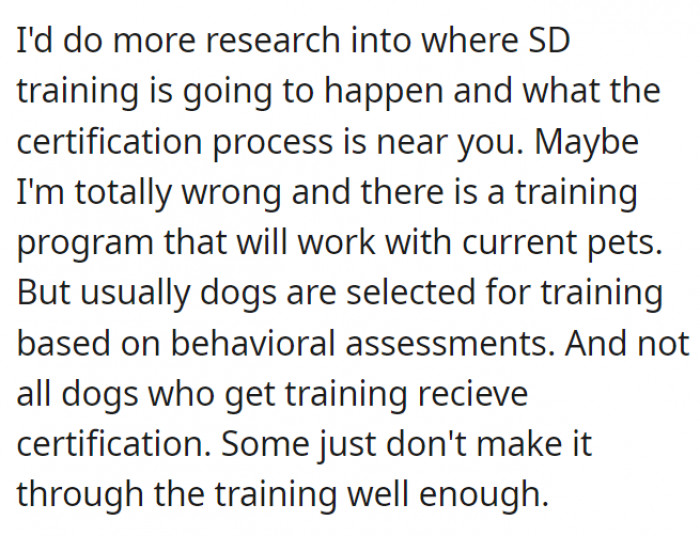
2. OP can also work with a private trainer for a dog of her own choice, and if not, the trainer can help her select a great dog for the program
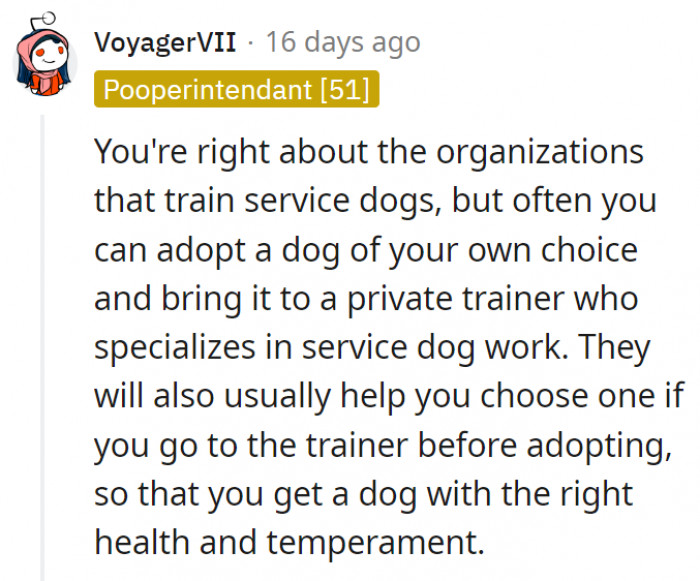
Practical Considerations for Training a Service Dog
From a psychological perspective, it's essential to consider the dog's welfare when deciding whether to train them as a service animal.
Animal behaviorists recommend evaluating the dog's temperament and health condition before making such a commitment.
Additionally, seeking professional guidance from a certified trainer can provide insights into whether this path is feasible without harming the dog's well-being.
3. Apparently, OP can also self-train with the help of a trainer, of course

4. There's no harm in getting an already trained service dog
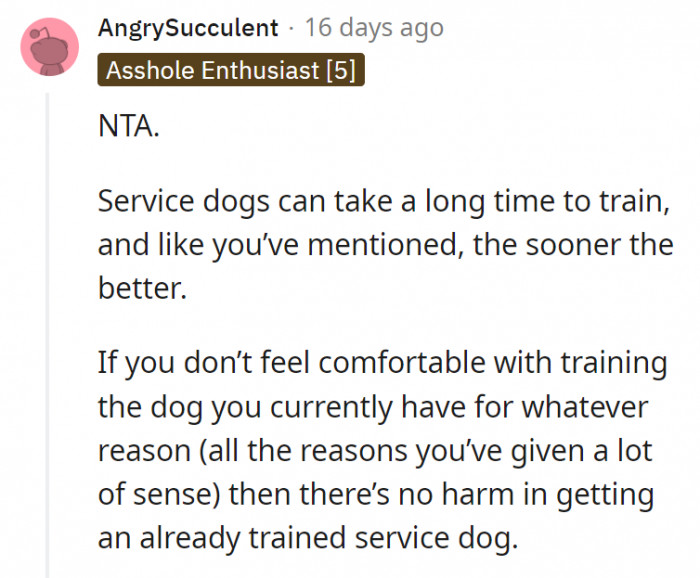
5. This person thinks OP might have unrealistic expectations about the service dog

Moreover, the concept of 'active coping' can be beneficial in this scenario.
According to research published in the Journal of Personality and Social Psychology, actively seeking solutions or alternatives can help alleviate feelings of helplessness.
This might mean considering other ways to support the individual's needs without involving the current dog, such as exploring the adoption of a second dog better suited for service work.
Training a service dog will take time before they can perfectly respond to the needs of their owner

They also remind OP that if she's going for a German Shepherd, she'd need a lot of exercise
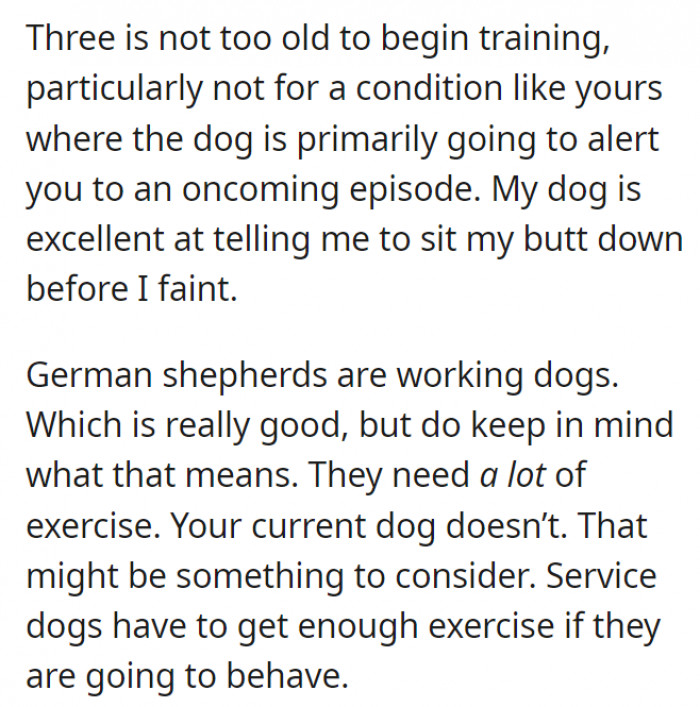
They also said that for most service dogs, the work is actually not fun and not 'work'

They also reminded OP that even if they're trained, they're just dogs and will behave like dogs
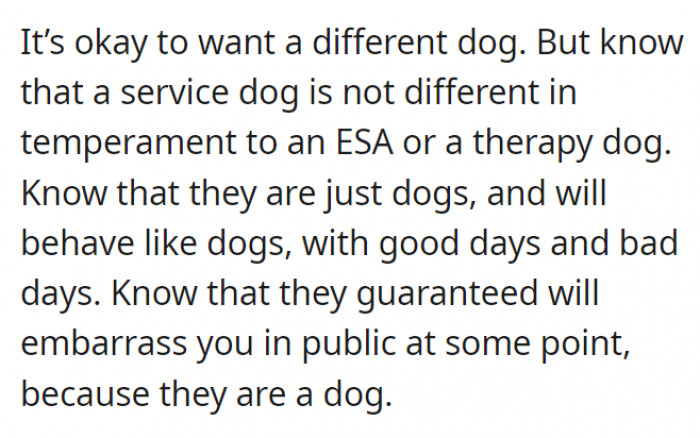
6. Training is never-ending and is a constant everyday cycle
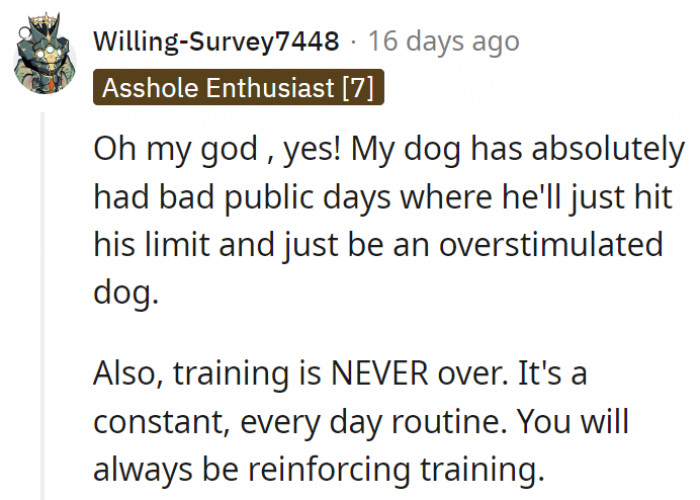
7. It's never too late to train a dog as long as it's done right
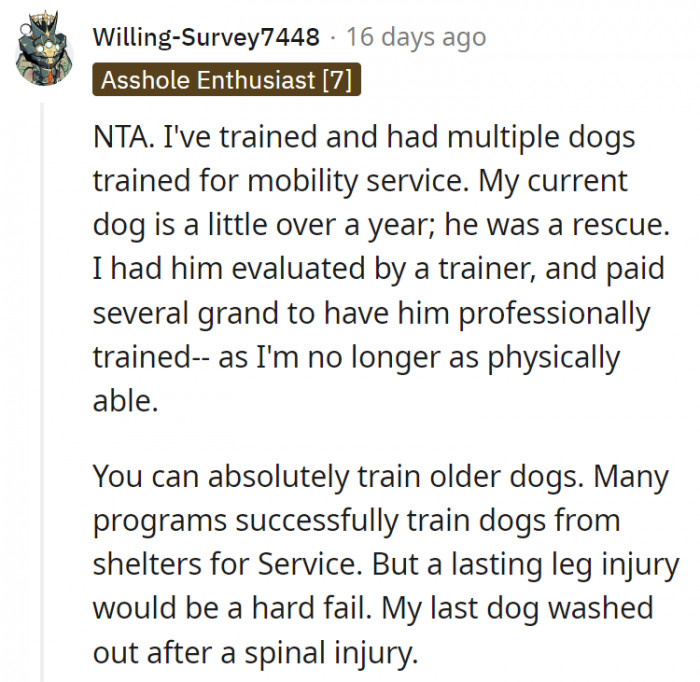
There are also several factors OP has to consider to find a good match

8. For OP's case, she needs a medical alert dog, and for that, smaller breeds are more known to be effective
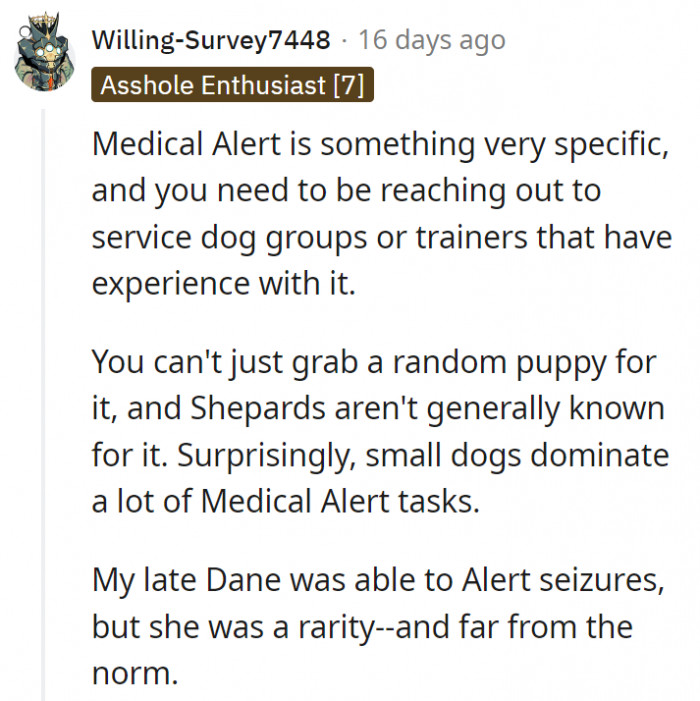
9. This person agrees with OP about not placing the burden on the family pet
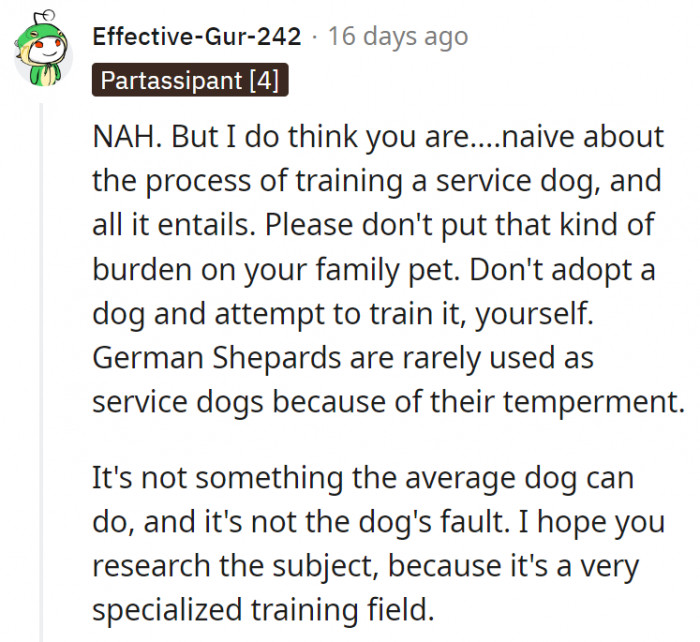
Most SDs come from bloodlines that have been bred and trained for that purpose

These pets are taught to bond with their person and can't be distracted by anyone or anything else
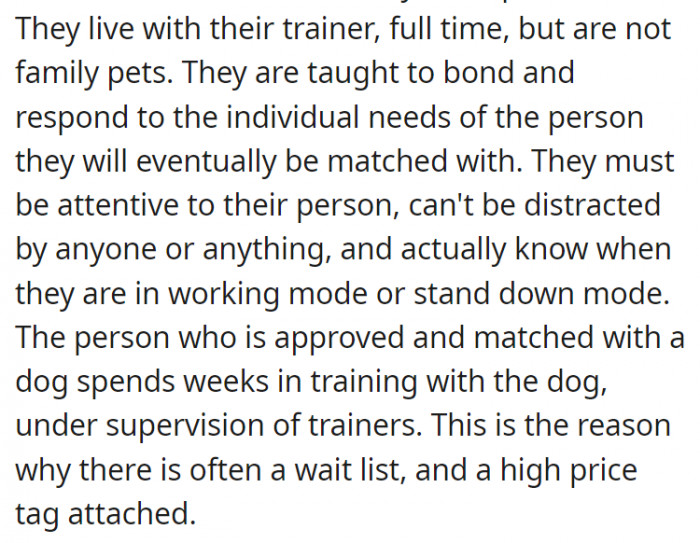
As this person said, pets and service dogs are not one and the same
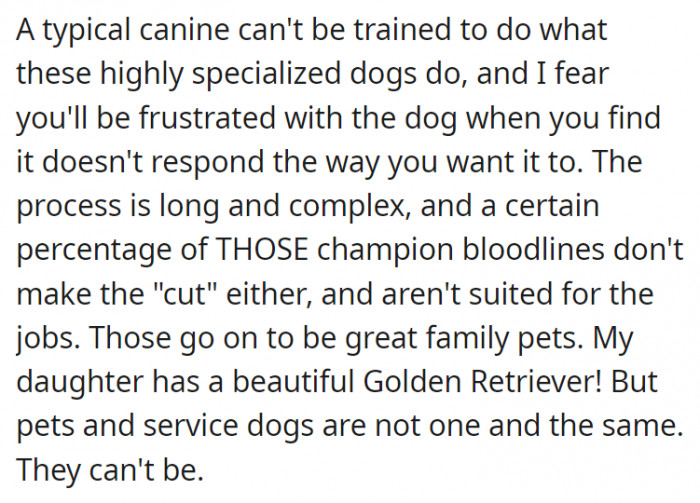
10. This person agrees with OP but recommends a poodle instead of a German Shepherd

Training a service dog is a long process that involves tedious work with the dog to ensure they respond to the right cues and aren't distracted by anything. That's what makes them such great helpers.
Hopefully, OP finds the service dog that is perfect for her, and hopefully, her family can understand her reasoning behind adopting another dog to become her SD.
Psychological Analysis
This situation reflects a common internal conflict where individuals grapple with their emotional attachments while considering the needs of their pets.
It's important to recognize that prioritizing the animal's welfare doesn't diminish the person's needs; rather, it showcases a mature understanding of responsibility and care.
Analysis generated by AI
Analysis & Alternative Approaches
Ultimately, the decision to train a current dog as a service animal should prioritize the well-being of both the individual and the animal.
Psychologists emphasize that balancing empathy for the animal with personal needs is crucial to making an informed decision.
Finding a solution that respects the dog's limitations while ensuring the individual's needs are met can lead to a more harmonious relationship.



